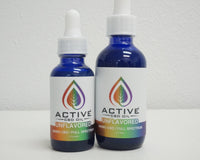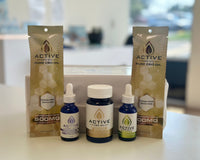You might have heard of full-spectrum CBD, broad-spectrum CBD, and CBD isolate. But what’s the difference? Does it matter? In short, who cares?
Let’s see why somebody might choose one over the others.
The hemp plant consists of a dizzying variety of compounds. Some of these compounds are expressed in many plants, but some are unique to hemp. Many of these compounds are known to exert some effect in the human body. Some of them have been used in traditional medicine for thousands of years. At least some of them alter the way our bodies process the other compounds present; their effects are sometimes additive, sometimes subtractive, and sometimes synergistic.
Full-spectrum CBD hemp products should contain everything that occurs in the plant itself: CBD, THC, other cannabinoids in trace amounts, chlorophyll, minerals, and all the volatile oils, or terpenes. Beware of products or companies that advertise “THC-free full-spectrum hemp oil”; there is no such thing. If it were full-spectrum, it wouldn’t be THC-free, even if the THC it did contain were under the 0.3% legal limit. Luckily, there’s a separate word for hemp products that contain everything from the plant except for the THC - that word is “broad-spectrum”.
So “full-spectrum” means everything from the plant, and “broad-spectrum” means everything from the plant except for the THC. The THC is separated in a process that we will cover in a future article on extraction and isolation of CBD from hemp. The final bit of jargon to learn here is “isolate”. A CBD isolate product started out as a full-spectrum extract. Then it was filtered and heated to remove everything from the product except for the CBD; the CBD was “isolated” from everything else in the plant. Now it’s CBD isolate.
Clearly CBD isolate is more difficult and time-consuming to make, and it’s a very pure product - often in the range of 95% to 100% pure CBD. But is it better than a crude extract?
In an analysis of 11 studies on CBD and childhood seizures, researchers found that whole-plant extracts were on average four times as potent as CBD isolate, and were effective at reducing seizures in almost twice as many people.
Studying breast cancer treatments, Spanish scientists determined that whole-plant botanical preparations of cannabis have more effective anti-tumor action than pure cannabinoids; a full-spectrum extract worked better than purified THC at shrinking cancer.
In 2015, a group of Israeli scientists compared the anti-inflammatory effects of a full-spectrum CBD extract and isolated CBD. They found that the whole-plant extract behaved much more predictably and was easier to dose. CBD isolate had a narrow window of effective dose, losing effectiveness at either too low or too high a dose.

Isolated CBD lacks the herbaceous, sometimes bitter flavor of full-spectrum oils, and is likeliest to be completely free of THC, which can cause a high and show up on drug tests. Yet CBD isolate does not appear to be as effective as full-spectrum products for a wide variety of conditions, at least according to several preliminary studies.
Thus, broad-spectrum products which contain everything from the plant except for the THC may be the ideal middle-of-the-road solution for consumers looking to avoid THC while getting the most out of their CBD.
We currently have 5 locations, 3 in Colorado Springs and 2 in Denver:





























